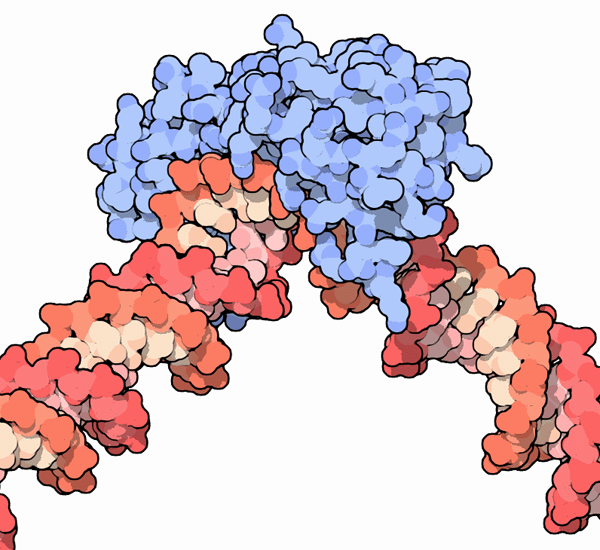|
Inhaltsübersicht | Nanomaschinen | Moleküle | Programme | Kurse | Fun | Links |
||
| > |
TATA-Binding Protein

TATA-Binding Protein
The enzyme RNA polymerase performs the delicate task of unwinding the two strands of DNA and transcribing the genetic information into a strand of RNA. But how does it know where to start? Our cells contain 30,000 genes encoded in billions of nucleotides. For each gene, the cell must be able to start transcription at the right place and at the right time.Getting Started
Specialized DNA sequences next to genes, called promoters, define the proper start site and direction for transcription. Promoters vary in sequence and location from organism to organism. In bacteria, typical promoters contain two regions that interact with the sigma subunit of their RNA polymerase. The sigma subunit binds to these DNA sequences, assists the start of transcription, and then detaches from the polymerase as it continues transcription through the gene. Our cells have a far more complex promoter system, using dozens of different proteins to ensure that the proper RNA polymerase is targeted to each gene. The TATA-binding protein is the central element of this system.The TATA Box
Our protein-coding genes have a characteristic sequence of nucleotides, termed the TATA box, in front of the start site of transcription. The typical sequence is something like T-A-T-A-a/t-A-a/t, where a/t refers to positions that can be either A or T. Surprisingly many variations on this theme also work, and one of the challenges in the study of transcription is discovering why some sequences work and others don't. The TATA-binding protein (sometimes referred to as TBP) recognizes this TATA sequence and binds to it, creating a landmark that marks the start site of transcription. When the first structures of TATA-binding protein were determined, researchers discovered that TATA-binding protein is not gentle when it binds to DNA. Instead, it grabs the TATA sequence and bends it sharply, as seen in PDB entries 1ytb, 1tgh and 1cdw.Next: Helpers
Last changed by: A.Honegger,